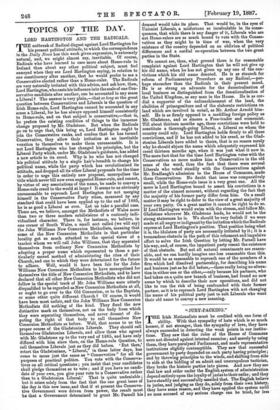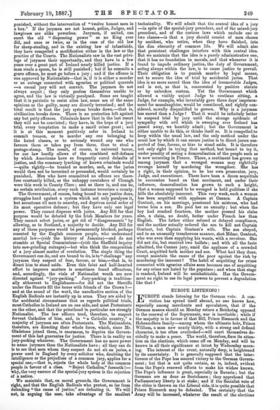"JURY-PACKING."
THE Irish Nationalists must be credited with one form of ability. With that sympathy of hats which is BO much keener, if not stronger, than the sympathy of love, they have always succeeded in detecting the weak points in our institu- tions. They saw that the rules of the House of Commons were not directed against internal enemies ; and merely by using them, they have paralysed Parliament, and made representative institutions slightly contemptible. They saw that successful government by party depended on each party having principles ; and by throwing principles to the winds, and shifting from side to side at the bidding of an adroit and unscrupulous tactician, they broke the historic parties into pieces. And now they see that law and order under the English system of administration depend entirely upon the loyalty of juries to their oaths ; and they have steadily and successfully assailed that. The English believe in juries, and judging as they do, solely from their own history, they have some reason, and they have applied the system until no man accused of any serious charge can be tried, far less
punished, without the intervention of "twelve honest men in a box." If the jurymen are not honest, police, Judges, and lawgivers are alike powerless. Jurymen, if united, can exert the old "dispensing power" as no King ever did, and once or twice, as in the case of the old law for sheep-stealing, and in the existing law of infanticide, they have compelled a modification either in the law or the practice of the Courts. The Nationalists saw in the vast privi- lege of jurymen their opportunity, and they have in a few years over a great part of Ireland nearly killed justice. If a man steals a spoon, he is still punished ; but if he commits a grave offence, he must go before a jury ; and if the offence is one approved by Nationalists—that is, if it is either a murder or an outrage connected with agrarian or political quarrels —a casual jury will not convict. The jurymen do not always acquit ; they only profess themselves unable to agree, and the law is virtually paralysed. Some are taught that it is patriotic to resist alien law, some are of the mune opinions as the guilty, many are directly terrorised ; and the total result is that the jury system breaks down,—that is, civilisation breaks down. There is no protection left against any but petty offences. Criminals know that in the last resort they will not be convicted ; they have, in the hope of a jury trial, every temptation to make a small crime great ; and it is at this moment positively safer in Ireland to commit treason, or to murder any one belonging to the hated classes, or to seriously wound any one who favours them or takes pay from them, than to steal a postage-stamp. The result, of course, is universal terror, for our law hardly allows of the combined self-defence by which Americans have so frequently cured defaults of justice, and the summary lynching of known criminals would —quite rightly—be treated as murder, and, as the juries would then not be terrorised or persuaded, would certainly be punished. Men who have committed no offence are there- fore constantly killed, as the unhappy caretakers of Clenagh were this week in County Glare; and as there is, and can be, no certain retribution, every such instance terrorises a county.
The Government, of course, being bound to see justice done, struggles hard against a system which not only paralyses it, but accustoms all men to anarchy, and deprives social order of its most operative defence; but they have only one legal power. They cannot dispense with juries. Any Bill for that purpose would be debated by the Irish Members for years. They cannot select juries, or get rid of " disagreements " by allowing, as in Scotland, a majority to decide. Any Bill for any of those purposes would be permanently blocked, perhaps resented by the English common people, who understand martial law—(vide the history of Jamaica)—and do not stumble at Special Commissions—(vide the Sheffield inquiry into saw-grinding outrages)—but who think the composition of a jury almost matter of revelation. The single thing the Government can do, and are bound to do, is to "challenge" any juryman they suspect of fear, favour, or bias,—that is, to direct him to stand aside. Even this faint and half-hearted effort to improve matters is sometimes found efficacious, and, accordingly, the vials of Nationalist wrath are now directed against "jury-packing." Jury-packing is tradition- ally abhorrent to Englishmen—for did not the Sheriffs under the Stuarts fill the boxes with friends of the Crown I- and at the sound of the word, the unreflective section of the English Radicals are instantly up in arms. They are aided by the accidental circumstance that as regards political trials, most Catholics in Ireland are on one side, and most Protestants on the other, and that the priesthood in particular are strongly Nationalist. The law officers tend, therefore, to suspect fervent Catholics of bias, and, in "a Catholic country," a majority of jurymen are often Protestants. The Nationalists, therefore, are directing their whole force, which, since Mr. Gladstone joined them, is enormous, to deprive the Govern- ment of this last guarantee for justice. There is in reality no jury-packing whatever. The Government has no more power to name jurymen than the Nationalists have ; all they can do is to see that men whom they suspect do not sit on juries, a power used in England by every solicitor who, doubting the intelligence or the prejudices of a common jury, applies for a special one,—that is, rejects the whole body of the common
people in favour of a class. "Reject Catholics," forsooth 1— why, the very essence of the special-jury system is the rejection of a nation.
We maintain that, on moral grounds, the Government is right, and that the English Radicals who protest, so far from defending "the cause of justice," are defeating it. We will not, in arguing the case, take advantage of the smallest technicality. We will admit that the central idea of a jury —in spite of the special-jury precedent, and of the mixed-jury precedent, and of the carious laws which exclude one or two classes—is that a jury should consist of men chosen by accident, who retire, when they have finished, into the dim obscurity of common life. We will admit also that persistent challenges interfere with this central idea. But we maintain that the idea is a purely administrative one, that it has no foundation in morals, and that whenever it is found to impede ordinary justice, the duty of Government, acting always within the law, is to cause justice to prevail. Their obligation is to punish murder by legal means, not to secure the idea of trial by accidental juries. That idea is no more sacred than the idea of irremovable Judges, and is not, as that is, consecrated by positive statute or by unbroken custom. Yet the Government which allowed a visibly unjust Judge to continue sitting, a Judge, for example, who invariably gave three days' imprison- ment for manslaughter, would be considered, and rightly con- sidered, morally disqualified to govern. Why is a juryman less sacred than a Judge That it would be infinitely better to suspend trial by jury until the strange epidemic of sympathy with evil which is sweeping over Ireland has passed away, we heartily admit ; but the Government is • either unable to do this, or thinks itself so. It is compelled to keep within the usual law, and the only method under the usual law by which it can secure justice is to direct jurors sus- pected of fear, favour, or bias to stand aside. It is therefore not only right in trying that method, but bound to try it, under penalty of seeing a demoralisation of the people such as is now occurring in France. There, a sentiment has grown up among jurymen that a wronged woman may rightfully revenge herself by murdering the wrongdoer. She has a right, in their opinion, to be her own prosecutor, jury, Judge, and executioner. There have been a dozen acquittals in succession based on that sentiment, and under their influence, demoralisation has grown to each a height, that a woman supposed to be wronged is held guiltless if she kills the absolutely innocent. This very week, such a woman has been acquitted with applause at Cannes. A Captain Gontaut, on his marriage, pensioned his mistress, who had borne him a son. He paid her an annuity ; but when the boy had reached fourteen, the mother pressed his claim also, a claim, no doubt, better under French law than English. The father either refused or delayed compliance, and the mother actually ordered the son to kill not Captain Gontaut, but Captain Gontaut's wife. The son obeyed, and in an unusually treacherous manner, shot Mdme. Gontaut, who was even then supplying his wants, with a revolver. She did not die, but received two bullets ; and with all the facts admitted, the Cannes jury, amid the applause of a crowded Court, acquitted both mother and son. What had they done, except maintain the cause of the poor against the rich by murdering the innocent? The habit of acquitting for crime connected with agrarian affairs soon becomes one of acquitting for any crime not hated by the populace ; and when that stage is reached, Ireland will be uninhabitable. Has the Govern- ment no right to use its legal powers to prevent a degradation like that



































 Previous page
Previous page